(新课标) Unit 11 Section A 1a-1c 课件 (新目标英语七下 Unit 11 How was your school trip?)
文档属性
| 名称 | (新课标) Unit 11 Section A 1a-1c 课件 (新目标英语七下 Unit 11 How was your school trip?) |
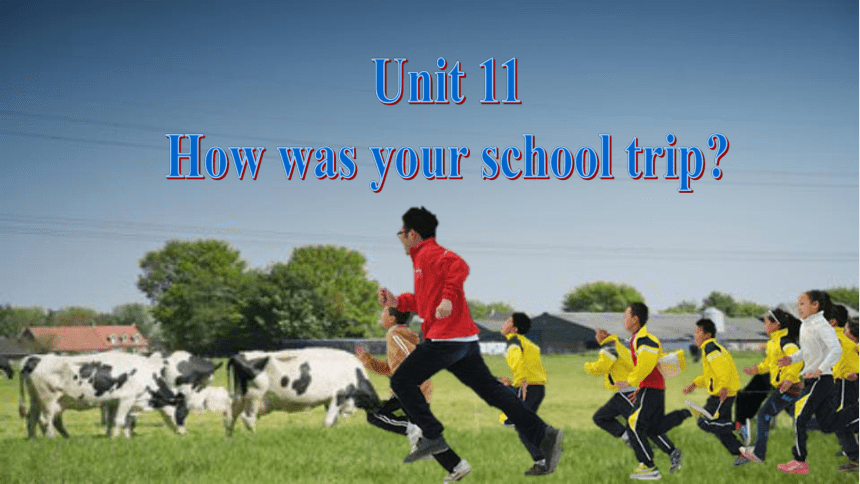
|
|
| 格式 | pptx | ||
| 文件大小 | 26.7MB | ||
| 资源类型 | 试卷 | ||
| 版本资源 | 人教新目标(Go for it)版 | ||
| 科目 | 英语 | ||
| 更新时间 | 2024-05-13 00:00:00 | ||
图片预览

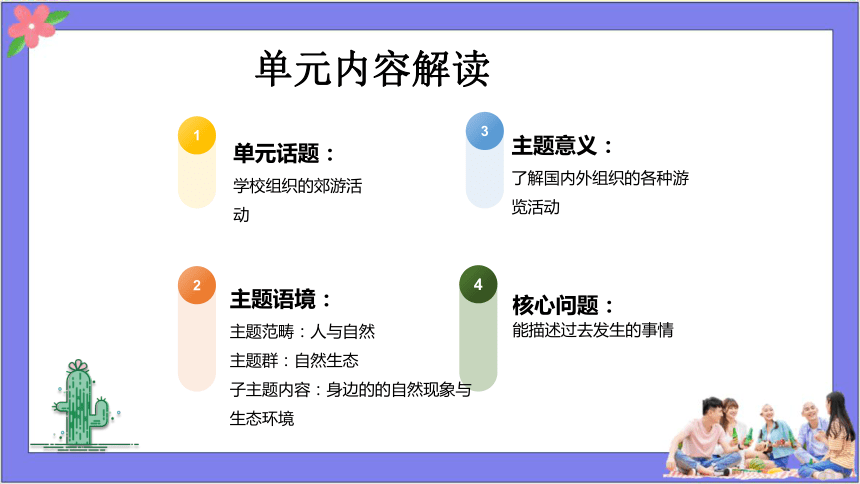
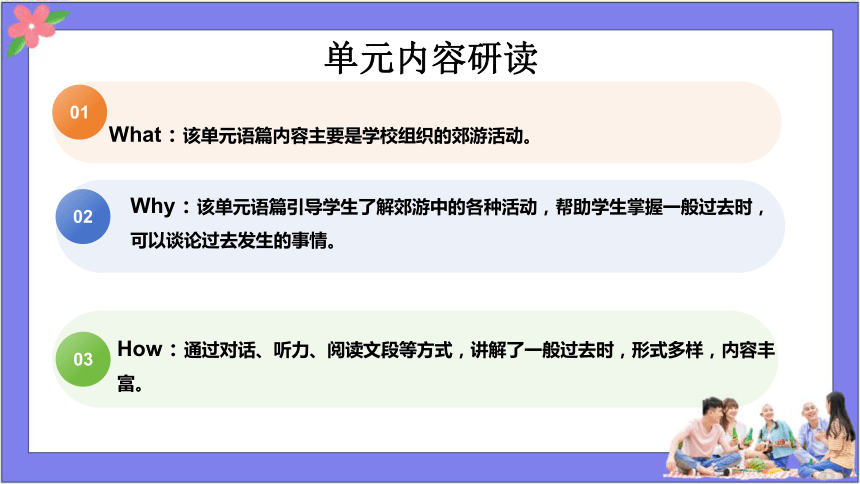
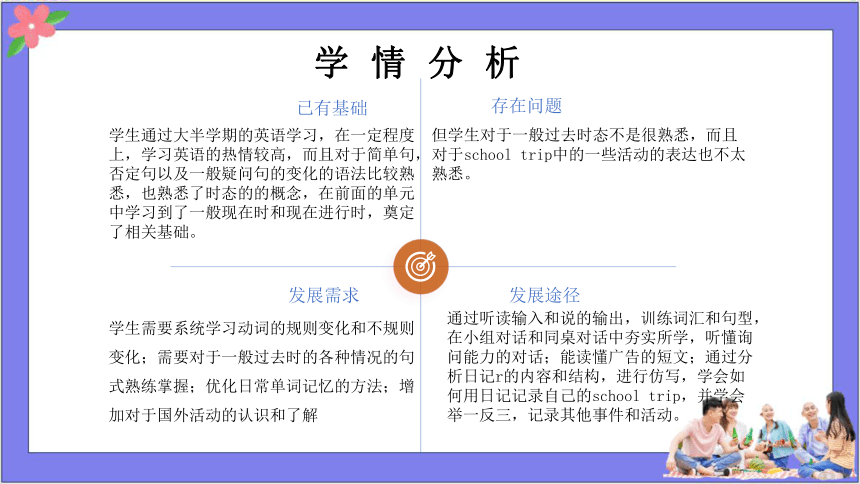
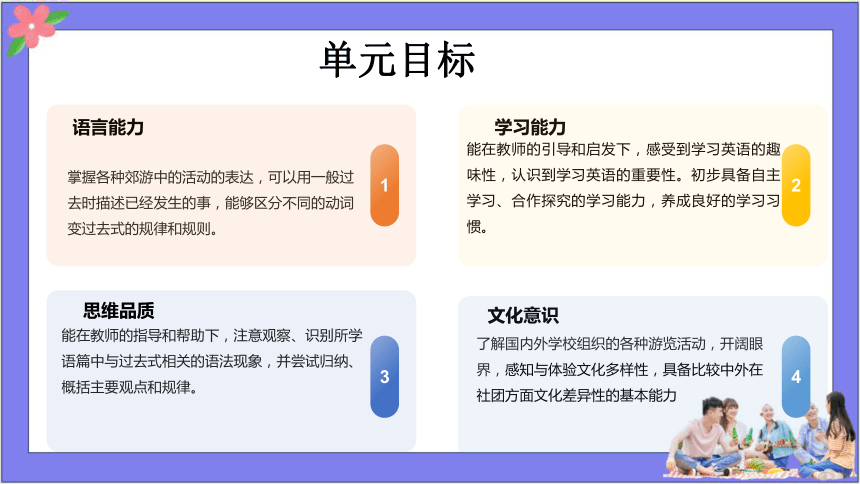
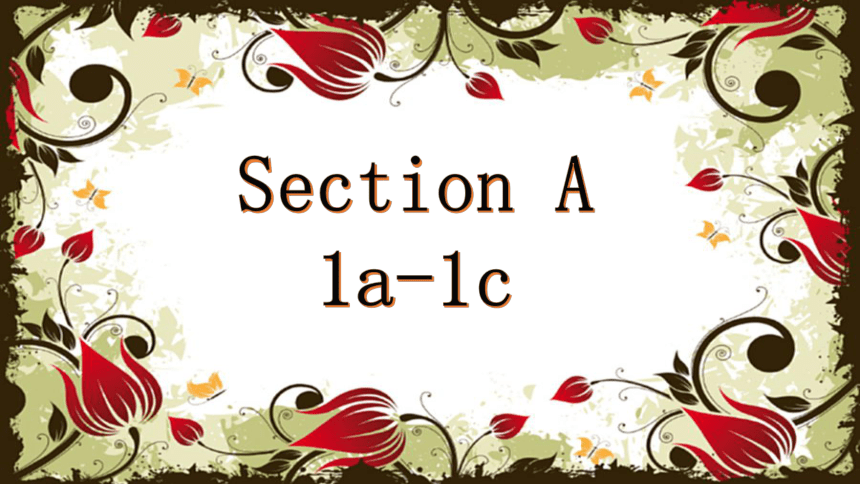
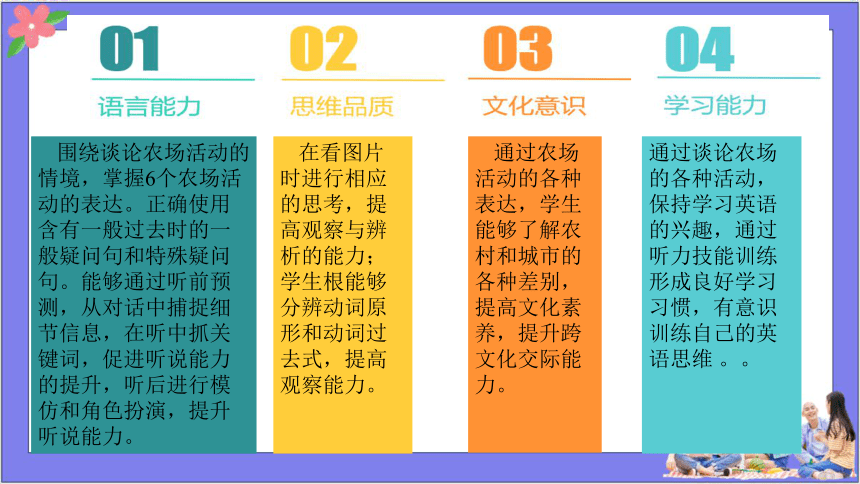
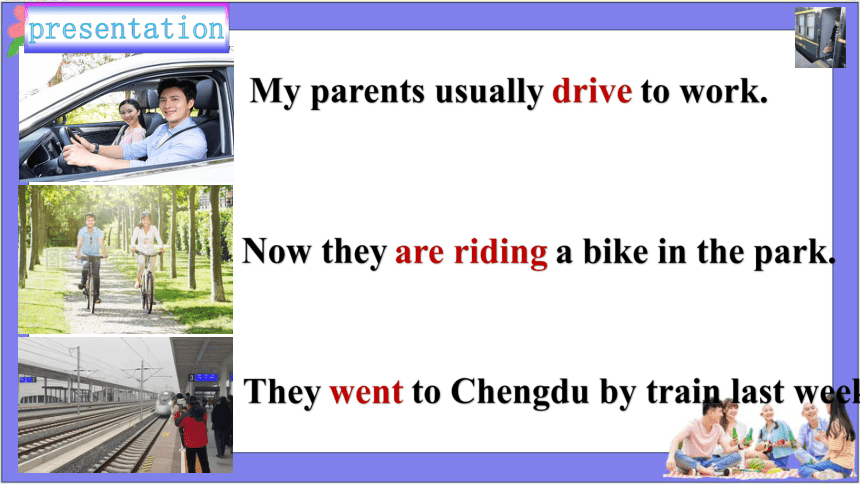
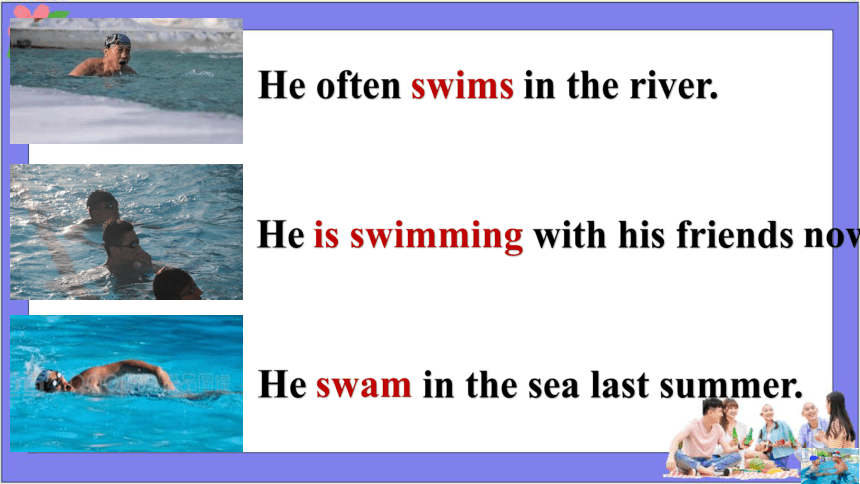
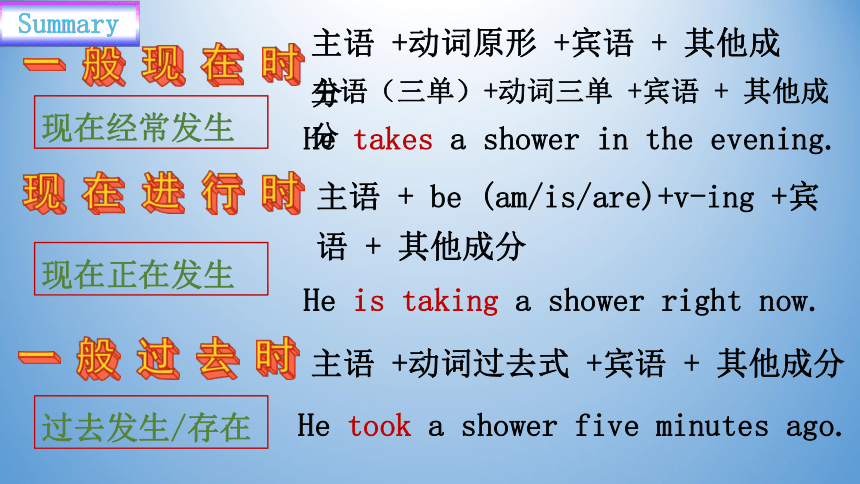
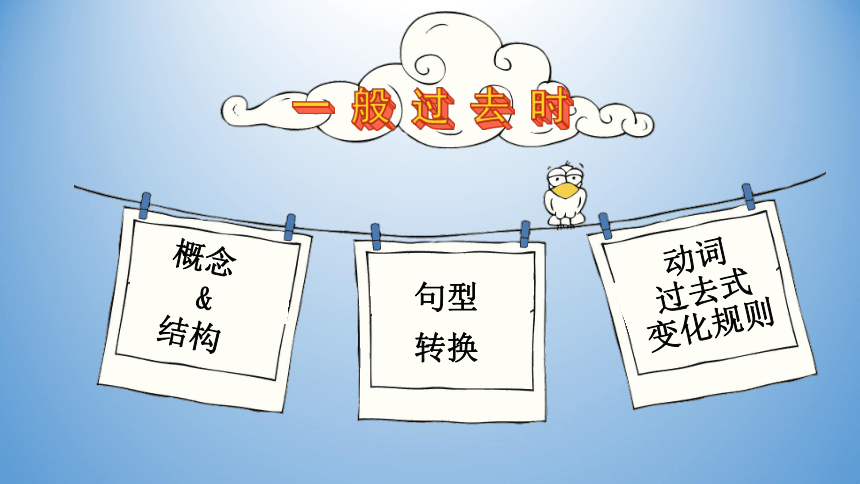
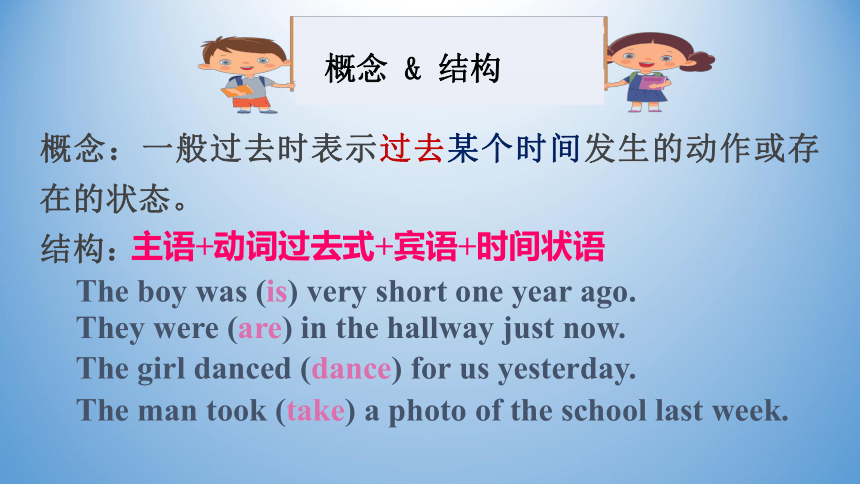
文档简介
(共41张PPT)
Unit 11
How was your school trip
单元内容解读
4
核心问题:
能描述过去发生的事情
2
主题语境:
主题范畴:人与自然
主题群:自然生态
子主题内容:身边的的自然现象与生态环境
1
单元话题:
学校组织的郊游活动
3
主题意义:
了解国内外组织的各种游览活动
单元内容研读
01
What:该单元语篇内容主要是学校组织的郊游活动。
02
Why:该单元语篇引导学生了解郊游中的各种活动,帮助学生掌握一般过去时,可以谈论过去发生的事情。
03
How:通过对话、听力、阅读文段等方式,讲解了一般过去时,形式多样,内容丰富。
已有基础
存在问题
发展需求
发展途径
学生通过大半学期的英语学习,在一定程度上,学习英语的热情较高,而且对于简单句,否定句以及一般疑问句的变化的语法比较熟悉,也熟悉了时态的的概念,在前面的单元中学习到了一般现在时和现在进行时,奠定了相关基础。
但学生对于一般过去时态不是很熟悉,而且对于school trip中的一些活动的表达也不太熟悉。
学生需要系统学习动词的规则变化和不规则变化;需要对于一般过去时的各种情况的句式熟练掌握;优化日常单词记忆的方法;增加对于国外活动的认识和了解
通过听读输入和说的输出,训练词汇和句型,在小组对话和同桌对话中夯实所学,听懂询问能力的对话;能读懂广告的短文;通过分析日记r的内容和结构,进行仿写,学会如何用日记记录自己的school trip,并学会举一反三,记录其他事件和活动。
学情分析
语言能力
掌握各种郊游中的活动的表达,可以用一般过去时描述已经发生的事,能够区分不同的动词变过去式的规律和规则。
能在教师的指导和帮助下,注意观察、识别所学语篇中与过去式相关的语法现象,并尝试归纳、概括主要观点和规律。
学习能力
能在教师的引导和启发下,感受到学习英语的趣味性,认识到学习英语的重要性。初步具备自主学习、合作探究的学习能力,养成良好的学习习惯。
文化意识
了解国内外学校组织的各种游览活动,开阔眼界,感知与体验文化多样性,具备比较中外在社团方面文化差异性的基本能力
1
思维品质
3
2
4
单元目标
Section A
1a-1c
围绕谈论农场活动的情境,掌握6个农场活动的表达。正确使用含有一般过去时的一般疑问句和特殊疑问句。能够通过听前预测,从对话中捕捉细节信息,在听中抓关键词,促进听说能力的提升,听后进行模仿和角色扮演,提升听说能力。
在看图片时进行相应的思考,提高观察与辨析的能力;学生根能够分辨动词原形和动词过去式,提高观察能力。
通过农场活动的各种表达,学生能够了解农村和城市的各种差别,提高文化素养,提升跨文化交际能力。
通过谈论农场的各种活动,保持学习英语的兴趣,通过听力技能训练形成良好学习习惯,有意识训练自己的英语思维 。。
My parents usually drive to work.
Now they are riding a bike in the park.
They went to Chengdu by train last week.
presentation
He often swims in the river.
He is swimming with his friends now.
He swam in the sea last summer.
一 般 现 在 时
现 在 进 行 时
一 般 过 去 时
主语 +动词原形 +宾语 + 其他成分
He takes a shower in the evening.
He is taking a shower right now.
主语 + be (am/is/are)+v-ing +宾语 + 其他成分
主语 +动词过去式 +宾语 + 其他成分
He took a shower five minutes ago.
现在经常发生
现在正在发生
过去发生/存在
主语(三单)+动词三单 +宾语 + 其他成分
Summary
一 般 过 去 时
句型
转换
动词
过去式
变化规则
概念
&
结构
概念 & 结构
概念:一般过去时表示过去某个时间发生的动作或存在的状态。
结构:
主语+动词过去式+宾语+时间状语
The boy was (is) very short one year ago.
They were (are) in the hallway just now.
The girl danced (dance) for us yesterday.
The man took (take) a photo of the school last week.
主语+动词过去式+宾语+时间状语
The man helped him yesterday.
Did the man help him yesterday
The man didn’t help him yesterday.
When did the man help him?
句
型
转
换
five days
three hours
two years
ago
just now
in +过去时间
常和表示过去的时间状语连用。如
1.play 2.visit
3.climb 4.pick 5.study 6.worry 7.stop 8.do 9.are 10.have
___________
___________
___________
___________
___________
___________
______________________
___________
___________
11.eat 12.buy 13.feed 14.see 15.get 16.grow 17.come 18.is 19.take 20.ride
___________
___________
___________
___________
___________
___________
___________
___________
___________
___________
played
visited
climbed
picked
studied
worried
stopped
did
were
had
ate
bought
fed
saw
got
grew
came
was
took
rode
动词的过去式
动词过去式变化规则
一般的动词 直接加-ed play-played /d/
want-wanted /id/
以字母e结尾的动词 直接加-d hope-hoped /t/
live-lived /d/
以辅音字母加y结尾的动词 变y为i, 再加-ed study-studied /d/
worry –worried /d/
重读闭音节结尾的动词,末尾只有一个辅音字母 双写这个辅音字母, 再加-ed stop-stopped /t/
shop-shopped /t/
<规则变化>
“Where do you usually go on weekend ”
cinema
shopping
mall
camping
do homework
Lead-in
Carol
She went to a farm last weekend.
Watch and guess: What did she do
Presentation
mike a cow
-Did Carol milk the cow?
-__________________
Yes, she did.
She milked a cow.
go for a walk
Yes, she did.
She went for a walk.
-Did Carol go for a walk
-__________________
ride a horse
No, she didn’t.
She rode a horse.
-__________________
Did Carol milk a horse
talk with
a farmer
No, she didn’t.
She talked with a farmer.
-Did Carol talk with a doctor?
-__________________
feed chickens
Yes, she did.
She fed chickens.
-Did Carol feed chickens
-__________________
take some photos
No, she didn’t.
She took many photos.
-Did Carol draw a picture
-__________________
1a
Match the phrases with the pictures.
e
b
a
c
f
d
1. went for a walk
2. milked a COW
3. rode a horse
4. fed chickens
5. talked with a farmer
6. took somephotos
___________
___________
___________
___________
___________
___________
go for a walk
milk a COW
ride a horse
feed chickens
talkewith a farmer
takw somephotos
went for a walk
milked a COW
rode a horse
fed chickens
talked with a farmer
took somephotos
原型
过去式
1b
Listen and circle the three things Carol did on her school trip in la.
1. went for a walk
2. milked a COW
3. rode a horse
4. fed chickens
5. talked with a farmer
6. took somephotos
___________
___________
___________
___________
___________
___________
e
b
a
c
f
d
A: Did Carol take any photos
B: Yes, she did.
Pair Work
1c
A: What ___ you do on your last school trip
B: I ...
did
Practice
Group work: Make a survey!
What did you do on your last school trip Did you …
Li xin went to Shanghai, went shopping
Yang xiaodan went to West Lake, went boating
Shao wei went to his aunt’s house, had pizza
I went to the beach, went swimming
Report
In my group,
Li xin went to Guangzhou. He went shopping. Yang xiaodan …
Shao wei …
And I … We …
1
milked a cow 给奶牛挤奶
milk 此处作及物动词,意为“给…挤奶”;还可作不及物动词,意为“挤奶,出奶”例:I helped my father to milk the cow. 我帮助我的父亲给奶牛挤奶。This cow milks very well. 这头奶牛出奶很好。知识拓展milk 还可用作不可数名词,意为”牛奶”例: Would you like some milk 你想喝些牛吗
Language points
2
fed chickens 喂鸡
fed为 feed 的过去式,feed 此处作及物动词,意为“喂养;饲养”,其后常接表示动物名称的词作宾语。
例: Don’t forget to feed your pet dog.别忘了喂你的宠物狗。
关于 feed 的搭配: feed sth.to sb./sth.把某物喂给某人/某物
例: She fed milk to the baby. =She fed the baby on/ with milk.她用牛奶喂这个婴儿。
3
-Did you see any cows 你看到一些奶牛了吗 -Yes,I did.l saw quite a lot.是的,我看到了。我看到了相当多(的奶牛)。
此问句是一般过去时的一般疑问句,用于询问过去发生的动作或事情;其中 did 是 do的过去式,在此作助动词,疑问句中用了助动词 did 时。
句中的谓语动词应用动词原形其句型结构是“Did+主语+动词原形+其他成分 “。其肯定答语为“Yes,主语+did.”否定答语为“No,主语+didn't.”
例: -Did you do your homework yesterday 昨天你做你的家庭作业了吗
-Yes, I did./No,I didn't.是的,我做了。/没有,我没做。
要点 1
3
-Did you see any cows 你看到一些奶牛了吗
-Yes, I did. l saw quite a lot. 是的,我看到了。我看到了相当多(的奶牛)。
quite a lot 意为“许多”,若后面接名词,则用 quite a lot of例: She is very young, but she knows quite a lot. 她很年轻,但她懂很多。have quite a lot of work to do. 我有许多工作要做。
要点 2
辨析:quite与very
quite 程度副词,意为“相当,完全” 可修饰副词、形容词、动词,与表“程度”的词连用 quite 与 very 与不定冠词连用时位置不同:“a+very+形容词+名词”;“quite+ a(n)+形容词+名词”
very 程度副词,意为“很,非常”,语气较 quite 重 可修饰副词、形容词,但不可直接修饰动词
1. Tina usually _____(go) to a park on weekends. But yesterday she ______(go) to a zoo and ______ (take) a bus there.
2. -- Where is Joe
-- He _________ (ride) a bike.
3. --______ she _______(feed) a cat
-- No, she didn't. She ______ (feed) chickens and________ (milk) a cow.
goes
went
took
is riding
Did
feed
milked
fed
Exercises
4.—Where did you go last weekend —I __________ to the Great Wall.A.go B.wentC.will go D.have gone
5.Last weekend I didn’t _______ any cows but I ______ some horses.A.see; see B.saw; saw C.see; saw D.saw; see
6.—Mum, I’m hungry. Is there ________ to eat —Yes, you can have some bread on the table.A.something B.nothing C.anything D.everything
7.—Did you go to the zoo —______. I went to a farm.A.Yes, I did B.No, I didn’t C.Yes, I do D.No, I don’t
8.The teacher ________ me ________ this school yesterday.A.show; around B.showed; at C.showed; around D.shows; at
B
C
C
B
C
Activities in farm
pick starwberries
milk a cow
go for a walk
feed chickens
ride a horse
take photos
talke with
famers
summary
sentences
pattern
-Did + 人称+事件?
-Yes, 人称+did./ No, 人称 didn't
-What did +人称+do?
-人称+事件(过去式)
Level B:
1. Master what you have learned in this lesson.
2. Preview the conversation in 2d
Level A:
1. Finish the extra exercise in your workbook.
2. Preview the reading section in section B
Homework
Thank you !
Unit 11
How was your school trip
单元内容解读
4
核心问题:
能描述过去发生的事情
2
主题语境:
主题范畴:人与自然
主题群:自然生态
子主题内容:身边的的自然现象与生态环境
1
单元话题:
学校组织的郊游活动
3
主题意义:
了解国内外组织的各种游览活动
单元内容研读
01
What:该单元语篇内容主要是学校组织的郊游活动。
02
Why:该单元语篇引导学生了解郊游中的各种活动,帮助学生掌握一般过去时,可以谈论过去发生的事情。
03
How:通过对话、听力、阅读文段等方式,讲解了一般过去时,形式多样,内容丰富。
已有基础
存在问题
发展需求
发展途径
学生通过大半学期的英语学习,在一定程度上,学习英语的热情较高,而且对于简单句,否定句以及一般疑问句的变化的语法比较熟悉,也熟悉了时态的的概念,在前面的单元中学习到了一般现在时和现在进行时,奠定了相关基础。
但学生对于一般过去时态不是很熟悉,而且对于school trip中的一些活动的表达也不太熟悉。
学生需要系统学习动词的规则变化和不规则变化;需要对于一般过去时的各种情况的句式熟练掌握;优化日常单词记忆的方法;增加对于国外活动的认识和了解
通过听读输入和说的输出,训练词汇和句型,在小组对话和同桌对话中夯实所学,听懂询问能力的对话;能读懂广告的短文;通过分析日记r的内容和结构,进行仿写,学会如何用日记记录自己的school trip,并学会举一反三,记录其他事件和活动。
学情分析
语言能力
掌握各种郊游中的活动的表达,可以用一般过去时描述已经发生的事,能够区分不同的动词变过去式的规律和规则。
能在教师的指导和帮助下,注意观察、识别所学语篇中与过去式相关的语法现象,并尝试归纳、概括主要观点和规律。
学习能力
能在教师的引导和启发下,感受到学习英语的趣味性,认识到学习英语的重要性。初步具备自主学习、合作探究的学习能力,养成良好的学习习惯。
文化意识
了解国内外学校组织的各种游览活动,开阔眼界,感知与体验文化多样性,具备比较中外在社团方面文化差异性的基本能力
1
思维品质
3
2
4
单元目标
Section A
1a-1c
围绕谈论农场活动的情境,掌握6个农场活动的表达。正确使用含有一般过去时的一般疑问句和特殊疑问句。能够通过听前预测,从对话中捕捉细节信息,在听中抓关键词,促进听说能力的提升,听后进行模仿和角色扮演,提升听说能力。
在看图片时进行相应的思考,提高观察与辨析的能力;学生根能够分辨动词原形和动词过去式,提高观察能力。
通过农场活动的各种表达,学生能够了解农村和城市的各种差别,提高文化素养,提升跨文化交际能力。
通过谈论农场的各种活动,保持学习英语的兴趣,通过听力技能训练形成良好学习习惯,有意识训练自己的英语思维 。。
My parents usually drive to work.
Now they are riding a bike in the park.
They went to Chengdu by train last week.
presentation
He often swims in the river.
He is swimming with his friends now.
He swam in the sea last summer.
一 般 现 在 时
现 在 进 行 时
一 般 过 去 时
主语 +动词原形 +宾语 + 其他成分
He takes a shower in the evening.
He is taking a shower right now.
主语 + be (am/is/are)+v-ing +宾语 + 其他成分
主语 +动词过去式 +宾语 + 其他成分
He took a shower five minutes ago.
现在经常发生
现在正在发生
过去发生/存在
主语(三单)+动词三单 +宾语 + 其他成分
Summary
一 般 过 去 时
句型
转换
动词
过去式
变化规则
概念
&
结构
概念 & 结构
概念:一般过去时表示过去某个时间发生的动作或存在的状态。
结构:
主语+动词过去式+宾语+时间状语
The boy was (is) very short one year ago.
They were (are) in the hallway just now.
The girl danced (dance) for us yesterday.
The man took (take) a photo of the school last week.
主语+动词过去式+宾语+时间状语
The man helped him yesterday.
Did the man help him yesterday
The man didn’t help him yesterday.
When did the man help him?
句
型
转
换
five days
three hours
two years
ago
just now
in +过去时间
常和表示过去的时间状语连用。如
1.play 2.visit
3.climb 4.pick 5.study 6.worry 7.stop 8.do 9.are 10.have
___________
___________
___________
___________
___________
___________
______________________
___________
___________
11.eat 12.buy 13.feed 14.see 15.get 16.grow 17.come 18.is 19.take 20.ride
___________
___________
___________
___________
___________
___________
___________
___________
___________
___________
played
visited
climbed
picked
studied
worried
stopped
did
were
had
ate
bought
fed
saw
got
grew
came
was
took
rode
动词的过去式
动词过去式变化规则
一般的动词 直接加-ed play-played /d/
want-wanted /id/
以字母e结尾的动词 直接加-d hope-hoped /t/
live-lived /d/
以辅音字母加y结尾的动词 变y为i, 再加-ed study-studied /d/
worry –worried /d/
重读闭音节结尾的动词,末尾只有一个辅音字母 双写这个辅音字母, 再加-ed stop-stopped /t/
shop-shopped /t/
<规则变化>
“Where do you usually go on weekend ”
cinema
shopping
mall
camping
do homework
Lead-in
Carol
She went to a farm last weekend.
Watch and guess: What did she do
Presentation
mike a cow
-Did Carol milk the cow?
-__________________
Yes, she did.
She milked a cow.
go for a walk
Yes, she did.
She went for a walk.
-Did Carol go for a walk
-__________________
ride a horse
No, she didn’t.
She rode a horse.
-__________________
Did Carol milk a horse
talk with
a farmer
No, she didn’t.
She talked with a farmer.
-Did Carol talk with a doctor?
-__________________
feed chickens
Yes, she did.
She fed chickens.
-Did Carol feed chickens
-__________________
take some photos
No, she didn’t.
She took many photos.
-Did Carol draw a picture
-__________________
1a
Match the phrases with the pictures.
e
b
a
c
f
d
1. went for a walk
2. milked a COW
3. rode a horse
4. fed chickens
5. talked with a farmer
6. took somephotos
___________
___________
___________
___________
___________
___________
go for a walk
milk a COW
ride a horse
feed chickens
talkewith a farmer
takw somephotos
went for a walk
milked a COW
rode a horse
fed chickens
talked with a farmer
took somephotos
原型
过去式
1b
Listen and circle the three things Carol did on her school trip in la.
1. went for a walk
2. milked a COW
3. rode a horse
4. fed chickens
5. talked with a farmer
6. took somephotos
___________
___________
___________
___________
___________
___________
e
b
a
c
f
d
A: Did Carol take any photos
B: Yes, she did.
Pair Work
1c
A: What ___ you do on your last school trip
B: I ...
did
Practice
Group work: Make a survey!
What did you do on your last school trip Did you …
Li xin went to Shanghai, went shopping
Yang xiaodan went to West Lake, went boating
Shao wei went to his aunt’s house, had pizza
I went to the beach, went swimming
Report
In my group,
Li xin went to Guangzhou. He went shopping. Yang xiaodan …
Shao wei …
And I … We …
1
milked a cow 给奶牛挤奶
milk 此处作及物动词,意为“给…挤奶”;还可作不及物动词,意为“挤奶,出奶”例:I helped my father to milk the cow. 我帮助我的父亲给奶牛挤奶。This cow milks very well. 这头奶牛出奶很好。知识拓展milk 还可用作不可数名词,意为”牛奶”例: Would you like some milk 你想喝些牛吗
Language points
2
fed chickens 喂鸡
fed为 feed 的过去式,feed 此处作及物动词,意为“喂养;饲养”,其后常接表示动物名称的词作宾语。
例: Don’t forget to feed your pet dog.别忘了喂你的宠物狗。
关于 feed 的搭配: feed sth.to sb./sth.把某物喂给某人/某物
例: She fed milk to the baby. =She fed the baby on/ with milk.她用牛奶喂这个婴儿。
3
-Did you see any cows 你看到一些奶牛了吗 -Yes,I did.l saw quite a lot.是的,我看到了。我看到了相当多(的奶牛)。
此问句是一般过去时的一般疑问句,用于询问过去发生的动作或事情;其中 did 是 do的过去式,在此作助动词,疑问句中用了助动词 did 时。
句中的谓语动词应用动词原形其句型结构是“Did+主语+动词原形+其他成分 “。其肯定答语为“Yes,主语+did.”否定答语为“No,主语+didn't.”
例: -Did you do your homework yesterday 昨天你做你的家庭作业了吗
-Yes, I did./No,I didn't.是的,我做了。/没有,我没做。
要点 1
3
-Did you see any cows 你看到一些奶牛了吗
-Yes, I did. l saw quite a lot. 是的,我看到了。我看到了相当多(的奶牛)。
quite a lot 意为“许多”,若后面接名词,则用 quite a lot of例: She is very young, but she knows quite a lot. 她很年轻,但她懂很多。have quite a lot of work to do. 我有许多工作要做。
要点 2
辨析:quite与very
quite 程度副词,意为“相当,完全” 可修饰副词、形容词、动词,与表“程度”的词连用 quite 与 very 与不定冠词连用时位置不同:“a+very+形容词+名词”;“quite+ a(n)+形容词+名词”
very 程度副词,意为“很,非常”,语气较 quite 重 可修饰副词、形容词,但不可直接修饰动词
1. Tina usually _____(go) to a park on weekends. But yesterday she ______(go) to a zoo and ______ (take) a bus there.
2. -- Where is Joe
-- He _________ (ride) a bike.
3. --______ she _______(feed) a cat
-- No, she didn't. She ______ (feed) chickens and________ (milk) a cow.
goes
went
took
is riding
Did
feed
milked
fed
Exercises
4.—Where did you go last weekend —I __________ to the Great Wall.A.go B.wentC.will go D.have gone
5.Last weekend I didn’t _______ any cows but I ______ some horses.A.see; see B.saw; saw C.see; saw D.saw; see
6.—Mum, I’m hungry. Is there ________ to eat —Yes, you can have some bread on the table.A.something B.nothing C.anything D.everything
7.—Did you go to the zoo —______. I went to a farm.A.Yes, I did B.No, I didn’t C.Yes, I do D.No, I don’t
8.The teacher ________ me ________ this school yesterday.A.show; around B.showed; at C.showed; around D.shows; at
B
C
C
B
C
Activities in farm
pick starwberries
milk a cow
go for a walk
feed chickens
ride a horse
take photos
talke with
famers
summary
sentences
pattern
-Did + 人称+事件?
-Yes, 人称+did./ No, 人称 didn't
-What did +人称+do?
-人称+事件(过去式)
Level B:
1. Master what you have learned in this lesson.
2. Preview the conversation in 2d
Level A:
1. Finish the extra exercise in your workbook.
2. Preview the reading section in section B
Homework
Thank you !
同课章节目录
- Unit 1 Can you play the guitar?
- Section A
- Section B
- Unit 2 What time do you go to school?
- Section A
- Section B
- Unit 3 How do you get to school?
- Section A
- Section B
- Unit 4 Don't eat in class.
- Section A
- Section B
- Unit 5 Why do you like pandas?
- Section A
- Section B
- Unit 6 I'm watching TV.
- Section A
- Section B
- Review of Units 1-6
- Unit 7 It's raining!
- Section A
- Section B
- Unit 8 Is there a post office near here?
- Section A
- Section B
- Unit 9 What does he look like?
- Section A
- Section B
- Unit 10 I'd like some noodles.
- Section A
- Section B
- Unit 11 How was your school trip?
- Section A
- Section B
- Unit 12 What did you do last weekend?
- Section A
- Section B
